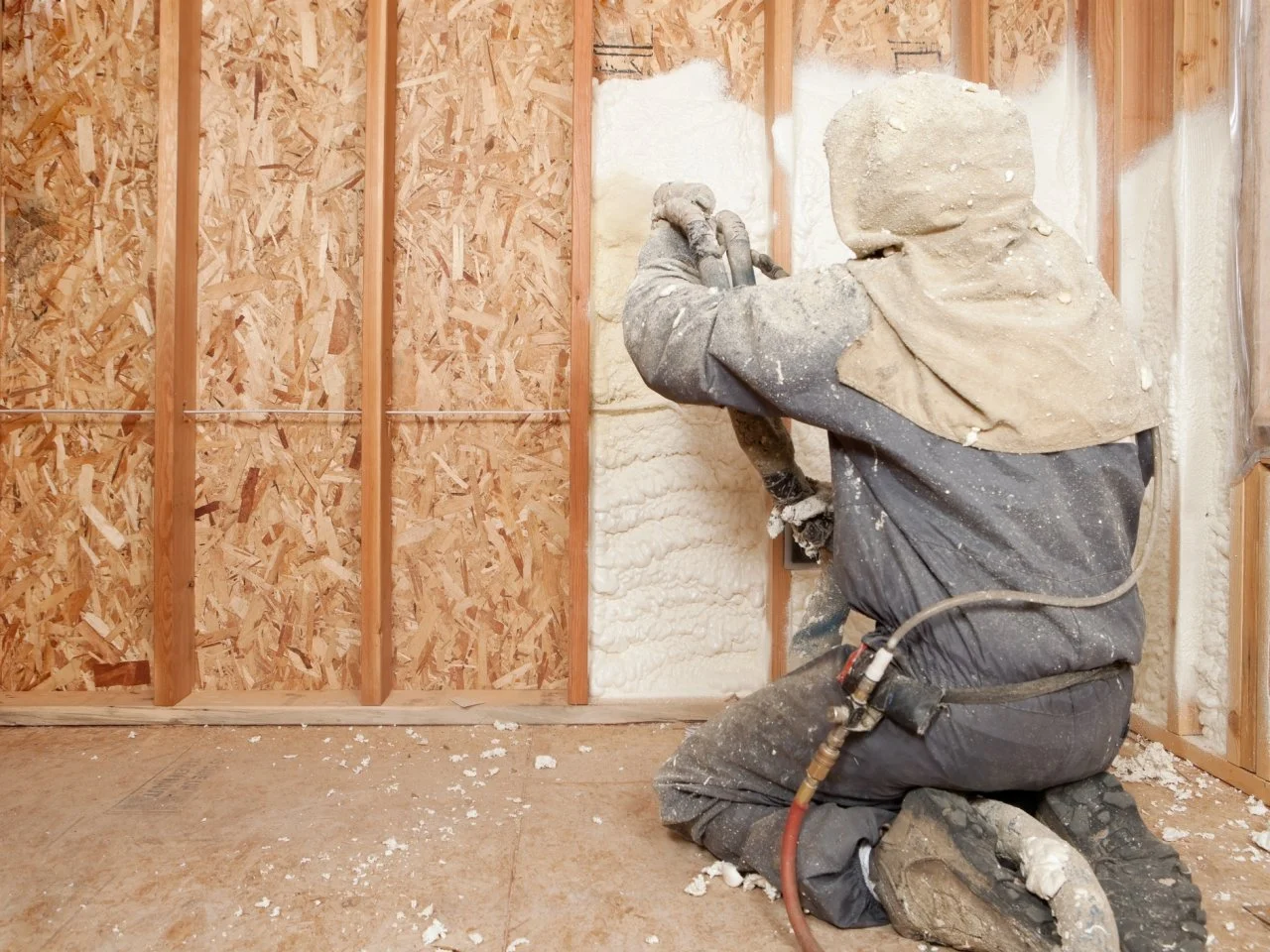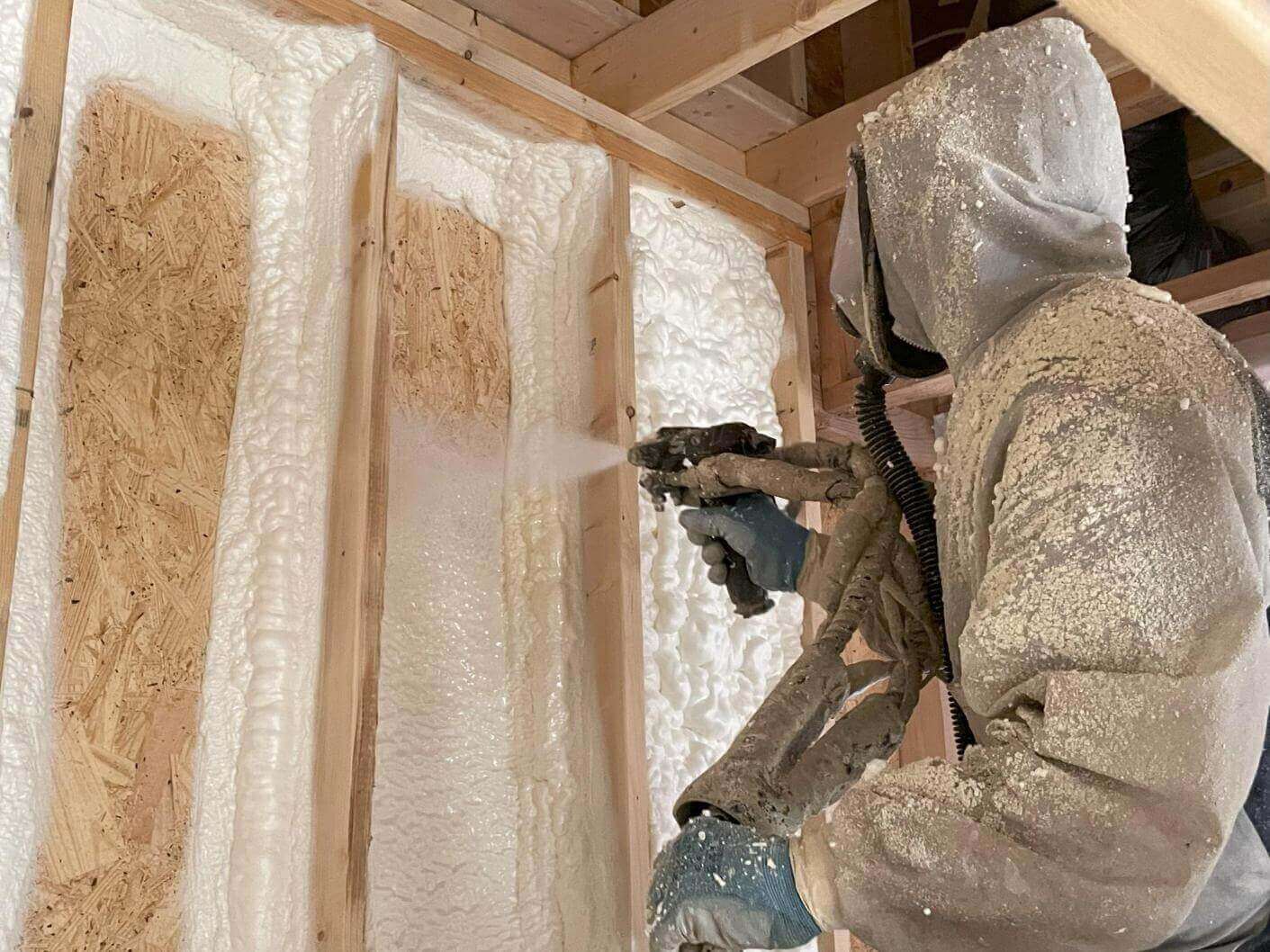Contrasting Spray Foam to Conventional Insulation: Which Is Much better?
Contrasting Spray Foam to Conventional Insulation: Which Is Much better?
Blog Article
Spray Foam: The Ultimate Remedy for Air Sealing and Insulation
Spray foam insulation has actually arised as a leading solution for reliable air sealing and thermal insulation, providing a distinct combination of homes that establish it besides typical approaches. Its capacity to expand and fill up gaps makes it specifically reliable in protecting against air leakage, which can dramatically impact energy effectiveness. Comprehending the complete extent of its benefits, installation processes, and contrasts with other insulation types is critical for making informed decisions. As we discover these facets, the effects for both new buildings and retrofits end up being progressively significant. What elements should influence your choice?
What Is Spray Foam?
Spray foam is a versatile insulation product that integrates the principles of air sealing and thermal resistance to boost power efficiency in structures. Composed primarily of polyurethane or various other similar substances, spray foam is applied as a fluid that expands upon contact with surfaces, producing a strong, continual layer of insulation. This unique building enables it to load gaps, cracks, and voids that conventional insulation products might overlook, supplying a premium air seal.
There are 2 major kinds of spray foam: open-cell and closed-cell. Open-cell spray foam is lighter and much more adaptable, offering exceptional noise absorption and a reduced R-value per inch - Spray Foam. On the other hand, closed-cell spray foam is denser, offering a greater R-value, dampness resistance, and added structural honesty to constructing components
The application procedure normally entails specialized equipment, ensuring a seamless application that sticks to different substrates, consisting of metal, wood, and concrete. This flexibility makes spray foam suitable for both brand-new buildings and retrofitting existing frameworks. Its capacity to produce an airtight barrier significantly contributes to minimizing power intake and boosting indoor air top quality, consequently making it a favored choice among building contractors and property owners alike.
Advantages of Spray Foam Insulation
One of one of the most significant advantages of spray foam insulation is its extraordinary capability to create a continuous air barrier, which effectively lessens power loss. Unlike standard insulation products, spray foam broadens to fill gaps and cracks, ensuring that air leakage is substantially reduced. This characteristic not just enhances energy effectiveness yet additionally causes decrease utility expenses gradually.
Additionally, spray foam insulation offers exceptional thermal resistance, adding to a more secure indoor environment. Its high R-value per inch permits efficient insulation in restricted areas, making it ideal for attics, walls, and crawl areas. Furthermore, the moisture-resistant properties of spray foam aid stop mold and mildew and mildew development, promoting healthier living problems.
One more important advantage of spray foam insulation is its sound-dampening top qualities (Spray Foam). It efficiently lowers sound transmission in between rooms, producing a quieter and much more comfy home environment. The durability of spray foam additionally stands apart, as it does not sag or settle with time, keeping its efficiency throughout its life expectancy
Just How Spray Foam Functions
Recognizing just how spray foam insulation functions is essential for appreciating its performance in air securing and thermal resistance. Spray foam insulation includes 2 key parts: isocyanate and polyol resin. When these parts are mixed, they go through a chemical response that creates the product to expand quickly, creating a thick foam that fills up cavities, voids, and cracks.
As the foam broadens, it follows surfaces, developing an impermeable seal that substantially decreases air infiltration. This particular makes spray foam insulation extremely effective at preventing drafts and dampness penetration, which can bring about power loss and damage gradually. In addition, the closed-cell variant of spray foam provides superior thermal resistance due to its stiff structure, properly decreasing warmth transfer.
The distinct properties of spray foam allow find here it to adapt to uneven surfaces, guaranteeing extensive coverage and a smooth obstacle. Because of this, spray foam insulation not only enhances power effectiveness however likewise contributes to improved interior air high quality by lowering the accumulation of irritants and toxins. Ultimately, recognizing the mechanics behind spray foam emphasizes its function as a premium selection for insulation and air sealing in both domestic and industrial applications.
Setup Process Overview

Before setup, the area should be properly cleaned and prepped, guaranteeing that surfaces are totally free from dust, debris, and wetness. Because impurities can jeopardize bond and general performance, this step is crucial. When the area is prepared, the application includes blending both elements of the spray foam, which increases upon call and fills up gaps effectively.
Trained experts need to perform the installment, using specialized tools to ensure consistent insurance coverage and optimum thickness. Safety preventative measures, including wearing safety equipment and making certain appropriate air flow, are vital throughout this process. After application, the foam normally remedies promptly, creating a strong barrier that improves power efficiency.
Contrasting Spray Foam to Typical Insulation
When assessing insulation choices, spray foam insulation stands out in contrast to typical products such as fiberglass and cellulose. Unlike go to the website fiberglass and cellulose, which can permit air infiltration, spray foam expands upon application, loading spaces and holes to produce a closed seal.
Furthermore, spray foam provides a higher R-value per inch than typical insulation kinds, offering more effective thermal resistance in a thinner account. This particular is especially helpful in spaces with restricted tooth cavity depth. Spray foam is resistant to wetness and mold and mildew development, which can be a significant issue with cellulose and fiberglass, especially in damp atmospheres.
Nonetheless, spray foam insulation generally brings a greater ahead of time price than its typical counterparts. House owners should evaluate this first financial investment against long-lasting power cost savings and efficiency benefits. Eventually, while both insulation kinds serve their objective, spray foam becomes an extra advanced solution for modern-day insulation demands, especially in terms of air sealing and thermal performance.

Conclusion
In recap, spray foam insulation stands for a highly efficient service for attaining optimal air securing and thermal resistance. Its one-of-a-kind homes, consisting of dampness resistance and noise dampening, make it ideal for different applications in both brand-new building and constructions and retrofitting projects (Spray Foam). The preliminary prices might be higher contrasted this content to standard insulation materials, the long-lasting benefits, such as substantial energy financial savings and enhanced interior air high quality, justify the investment and highlight its worth in modern structure methods.
Spray foam insulation has actually emerged as a leading service for efficient air securing and thermal insulation, supplying an unique combination of residential properties that set it apart from traditional techniques.Spray foam is a functional insulation product that integrates the principles of air sealing and thermal resistance to boost power efficiency in buildings.When reviewing insulation choices, spray foam insulation stands out in contrast to standard products such as fiberglass and cellulose. Ultimately, while both insulation types offer their purpose, spray foam emerges as a much more sophisticated service for modern insulation needs, specifically in terms of air securing and thermal efficiency.
In recap, spray foam insulation stands for a highly efficient remedy for attaining ideal air securing and thermal resistance.
Report this page